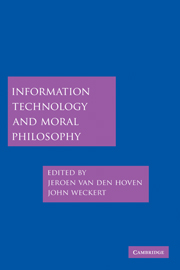Book contents
- Frontmatter
- Contents
- List of Contributors
- Introduction
- 1 Norbert Wiener and the Rise of Information Ethics
- 2 Why We Need Better Ethics for Emerging Technologies
- 3 Information Ethics: Its Nature and Scope
- 4 The Transformation of the Public Sphere: Political Authority, Communicative Freedom, and Internet Publics
- 5 Democracy and the Internet
- 6 The Social Epistemology of Blogging
- 7 Plural Selves and Relational Identity: Intimacy and Privacy Online
- 8 Identity and Information Technology
- 9 Trust, Reliance, and the Internet
- 10 Esteem, Identifiability, and the Internet
- 11 Culture and Global Networks: Hope for a Global Ethics?
- 12 Collective Responsibility and Information and Communication Technology
- 13 Computers as Surrogate Agents
- 14 Moral Philosophy, Information Technology, and Copyright: The Grokster Case
- 15 Information Technology, Privacy, and the Protection of Personal Data
- 16 Embodying Values in Technology: Theory and Practice
- 17 Information Technology Research Ethics
- 18 Distributive Justice and the Value of Information: A (Broadly) Rawlsian Approach
- Select Bibliography
- Index
- References
5 - Democracy and the Internet
Published online by Cambridge University Press: 21 July 2009
- Frontmatter
- Contents
- List of Contributors
- Introduction
- 1 Norbert Wiener and the Rise of Information Ethics
- 2 Why We Need Better Ethics for Emerging Technologies
- 3 Information Ethics: Its Nature and Scope
- 4 The Transformation of the Public Sphere: Political Authority, Communicative Freedom, and Internet Publics
- 5 Democracy and the Internet
- 6 The Social Epistemology of Blogging
- 7 Plural Selves and Relational Identity: Intimacy and Privacy Online
- 8 Identity and Information Technology
- 9 Trust, Reliance, and the Internet
- 10 Esteem, Identifiability, and the Internet
- 11 Culture and Global Networks: Hope for a Global Ethics?
- 12 Collective Responsibility and Information and Communication Technology
- 13 Computers as Surrogate Agents
- 14 Moral Philosophy, Information Technology, and Copyright: The Grokster Case
- 15 Information Technology, Privacy, and the Protection of Personal Data
- 16 Embodying Values in Technology: Theory and Practice
- 17 Information Technology Research Ethics
- 18 Distributive Justice and the Value of Information: A (Broadly) Rawlsian Approach
- Select Bibliography
- Index
- References
Summary
Is the Internet a wonderful development for democracy? In many ways it certainly is. As a result of the Internet, people can learn far more than they could before, and they can learn it much faster. If you are interested in issues that relate to public policy – air quality, wages over time, motor vehicle safety, climate change – you can find what you need to know in a matter of seconds. If you are suspicious of the mass media and want to discuss issues with like-minded people, you can do that, transcending the limitations of geography in ways that could barely be imagined even a decade ago. And if you want to get information to a wide range of people, you can do that, via email, blogs, or Web sites; this is another sense in which the Internet is a great boon for democracy.
But in the midst of the celebration, I want to raise a note of caution. I do so by emphasizing one of the most striking powers provided by emerging technologies: the growing power of consumers to ‘filter’ what they see. As a result of the Internet and other technological developments, many people are increasingly engaged in the process of ‘personalization’, which limits their exposure to topics and points of view of their own choosing. They filter in and they also filter out, with unprecedented powers of precision. Relevant Web sites and blogs are being created every week.
- Type
- Chapter
- Information
- Information Technology and Moral Philosophy , pp. 93 - 110Publisher: Cambridge University PressPrint publication year: 2008
References
- 30
- Cited by

